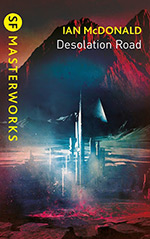
![]() Triseult
Triseult
5/21/2012
![]()
Desolation Road is a magic realist tale of the birth, life, and ultimate destiny, of a desert town. It just so happens that this town is set on a terraformed Mars.
I'm a big fan of Ian McDonald since reading the brilliant The Dervish House, and this, his first novel, has many of the hallmarks of his future talent. There's the stellar prose, of course; often brilliant, sometimes good enough that you want to put down the book to applaud. There's this sense of worldliness: his futuristic Mars is not a mere projection of Western culture, but a cool patchwork of many different societies, including Middle Eastern, South Asian, and African. There's the plethora of characters, sometimes barely more than a sketch, but never boring nor cliché. And, above all, there's a powerful sense of place, of location as character, as we see the town of Desolation Road grow from a one-man outpost, to an industrial hotbed and beyond.
There isn't much about this book that's conventional SF in any way. Despite being set on something approaching Kim Stanley Robinson's Mars, McDonald takes Clarke's "any sufficiently advanced technology" maxim for a spin, by using SF brushes to paint a deeply fantastic world. The foundations of the novel may be hard science fiction, but the execution is fantastic, even mythological and messianic in parts. A sense of wonder permeates the story's fantastical elements, a sense that miracles are possible, that magic exists in this technological world. The narrative keeps the reader off-balance, as it introduces new SF concepts at inopportune moments, instead of laying them out early on and staying consistent with them. Elsewhere it would be a terrible flaw, but here it's sheer brilliance.
The novel evolves more as a patchwork of individual stories than a series of linear events. Throughout the course of the narrative, we meet three generations of Desolation Road inhabitants, and the side-characters keep piling on. Almost all chapters function as snapshots or short stories using Desolation Road as its setting, which makes for a whimsical though uneven read. Eventually the stories coalesce; but paradoxically, this is where the book loses some of its impact. When all the characters converge for a final act, it becomes hard to keep track of who is who. Furthermore, the whimsical tone of the previous chapters means that it's hard to take sides when a real conflict erupts. Given the gentleness of the tone of the first 300 pages, the final act of the novel are filled with a terrible amount of noise and blood.
If there's one major flaw to the novel, it's the sheer volume of inventiveness and characters that McDonald throws in. There's enough here for at least five different novels, and some of the ideas and characters begin to trip on one another after a while. Characters who had been introduced fifty pages earlier pop up unexpectedly, sometimes so out of context that it's hard to remember who they are. SF concepts struggle for breathing space.
But when it's not trying to stir up a reality-shattering conflict, in the quieter parts of its narrative, Desolation Road is brilliant in its evocative restraint, in the wonders it pulls from the terraformed Martian soil. Some stories, like that of the guitar-wielding Hand, or the emprisoned angel, were beautiful SF of a sort I had never read before. And in this, Desolation Road far exceeds its biggest flaws.